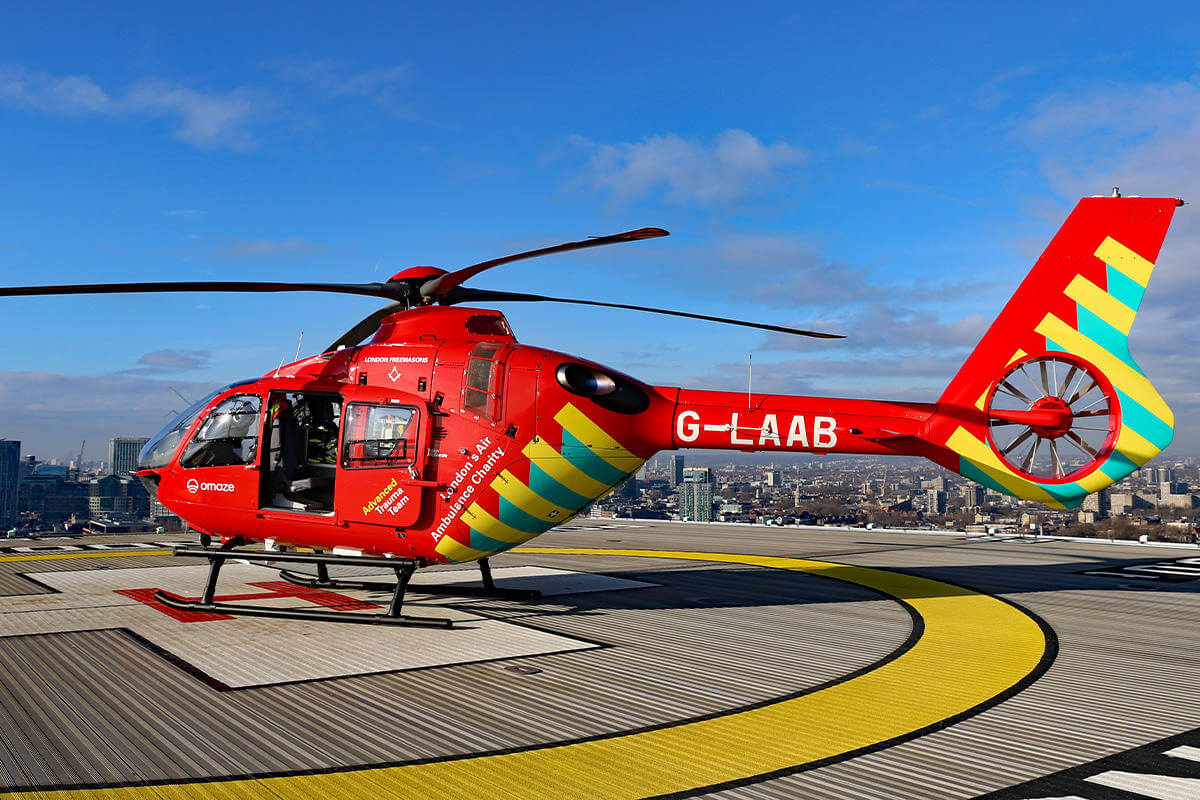
London Air Ambulance Helicopter Pilot (HEMS): A Day in the Life
Discover what it’s like to be a London Air Ambulance HEMS helicopter pilot. Adele Dobler shares her career path, insider insights and advice for aspiring pilots.
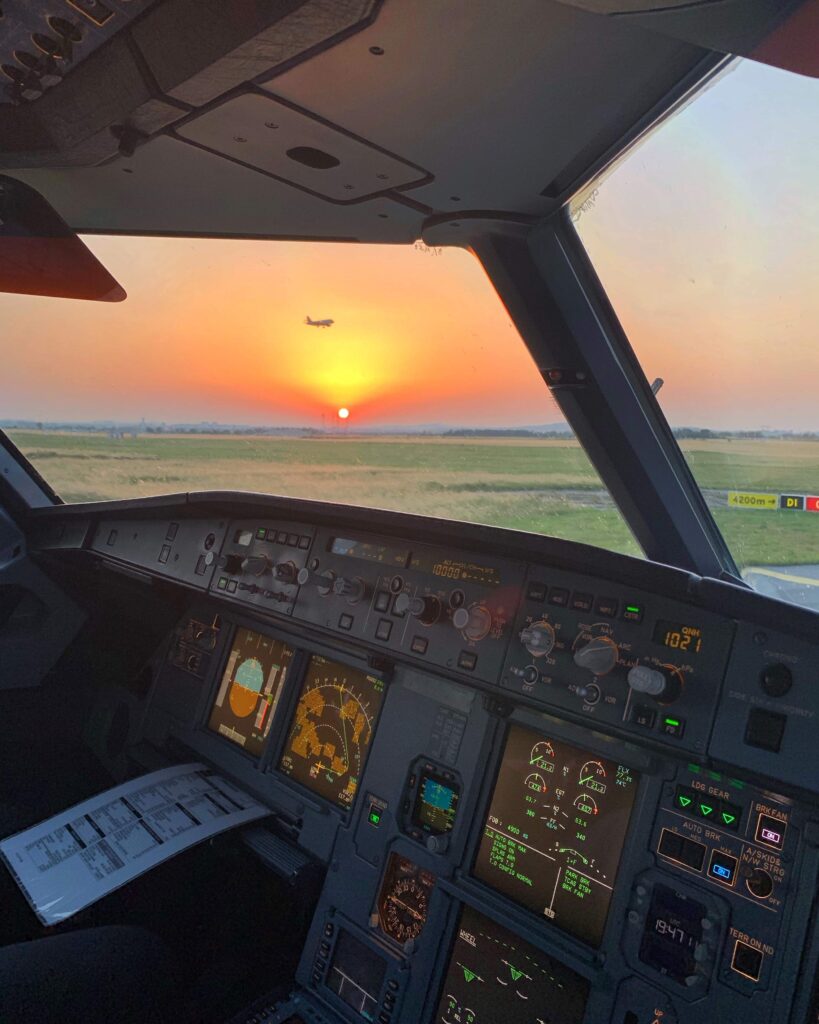
Share Post With Friends
Senior First Officer with EasyJet based at London Gatwick Airport
As an Airline Pilot with EasyJet, I operate the Airbus A320 series out of London Gatwick airport, with my primary task being to assist the captain with the safe and efficient operation. I help ensure the safety of our passengers and crew and am essentially a Commander in training. I’m second in command of the aircraft so should anything happen to the Captain, I will assume Command. I fly the aircraft on one leg and monitor on the other.
On an Easyjet pilot roster, you’ll either be on an “early” or a “late”, so I’ll give you a run-down of a recent interesting early with a few varied challenges on a trip down to Gibraltar airport.
03:30am alarm (7 years in and still not used to this). Quick morning stretches followed by a cold shower to kick my body into life and ensure I don’t fall back to sleep on the 40-minute drive to London Gatwick airport. From the car park it’s a 5-minute stroll straight to the staff security checkpoint. It’s the usual rub down and questioning over whether the yoghurt in my overnight oats will be allowed to continue past this point with me.
From here we used to go to the crew room to meet the crew and likely bump into others we know, but times have changed. I look on my easyJet company supplied iPad to find where the aircraft is parked and walk through the airport by myself to meet the crew onboard. Arriving at the aircraft it’s a quick hello to any cabin crew at the front as I board. Gatwick is such a large base that as an easyJet First Officer here, It’s very rare to recognize anyone and today is no different.
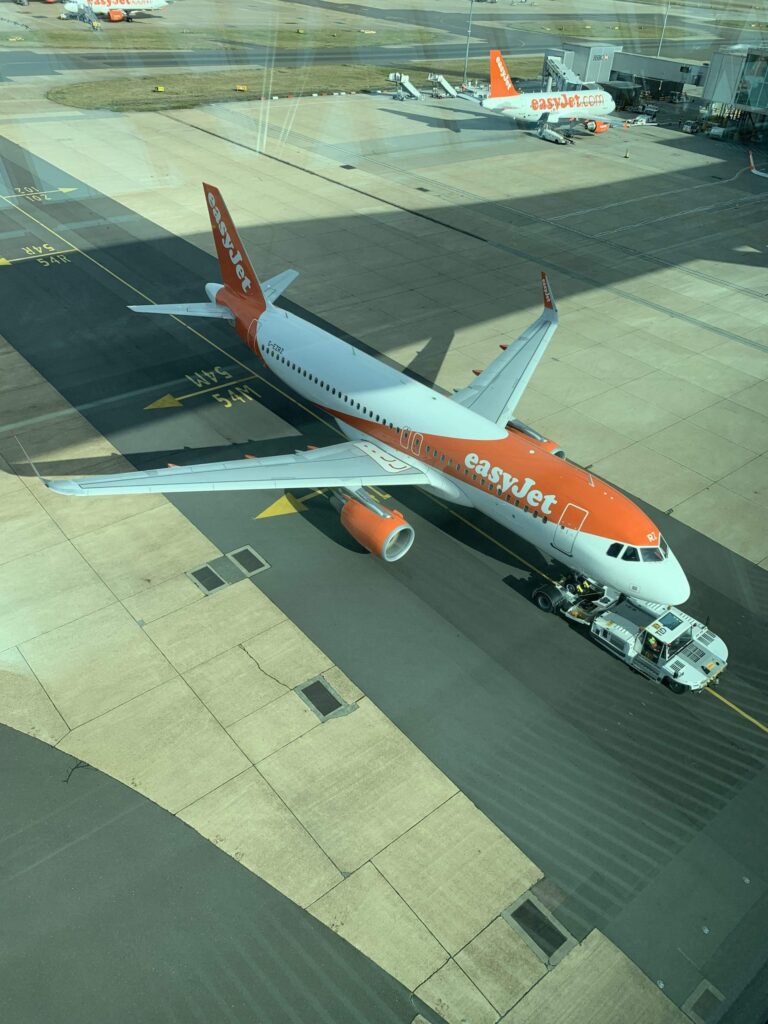
I then dive into the flight deck to start prep. The captain was there before me today and once again it’s someone I’ve never met before, so it’s a quick introduction followed by a discussion about who’s going to fly which leg; One of us will be Pilot Flying, responsible for the aircrafts handling & flightpath, whilst the other is Pilot Monitoring, responsible for radios and you guessed it, monitoring. This is then reversed for the return leg. Today there’s only 2 legs to be flown, outbound to Gibraltar and back, but we can often have 4 or sometimes 6 legs each day. With easyJet we very rarely stay overnight anywhere, often doing 2 or 4 legs and always ending up at back at London Gatwick airport. Looking at the METAR (weather readout), it shows the crosswinds at Gibraltar airport are on the aircraft’s limits (38kts) so the captain claims the outbound leg, as the limit for first officer and senior first officers is much less than the aircrafts limit (20kts).

All our performance, flight plans etc are on our iPads so we run through that, followed by a brief with the cabin crew to touch on any important points for the day. We inform them about the wind and the possibility of diverting elsewhere if we can’t get in.
30 minutes later with the passengers on, performance done, doors closed, we’re ready to push back, taxi and blast through the low layer of cloud, so we can sun ourselves on the way to Spain.
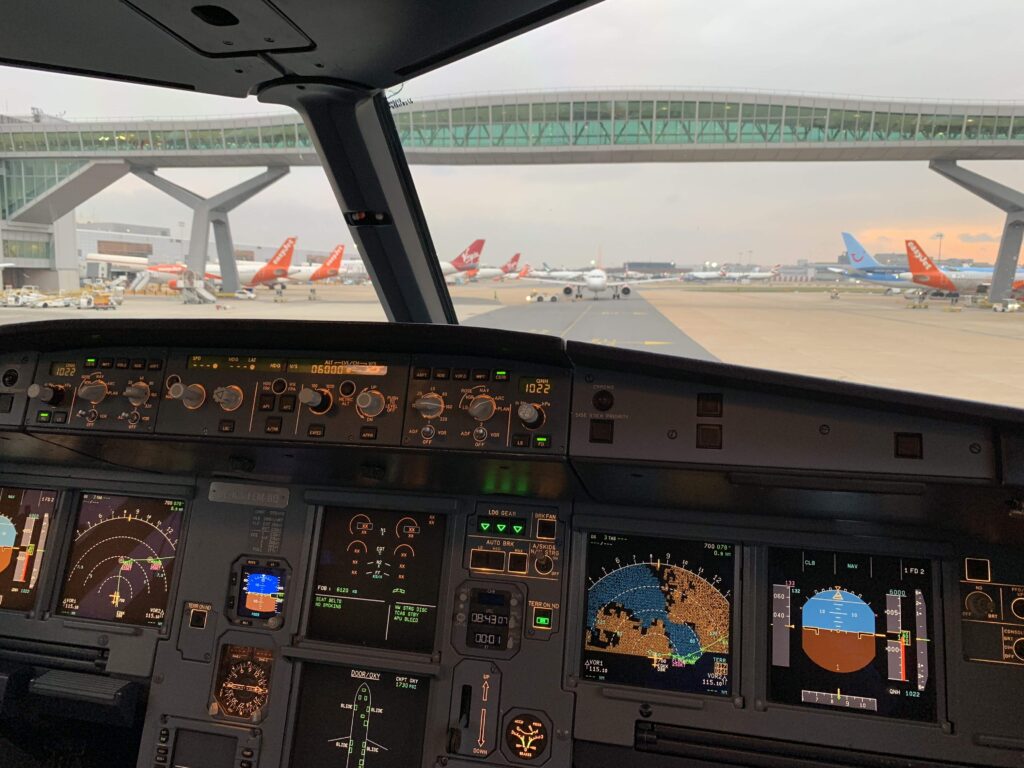
During the 2 hour leg we eat breakfast (packaged scrambled eggs cooked), exchange the usual small talk and then around an hour and half from destination, our focus turns to the approach and landing into Gibraltar airport. We noted on the ground that yesterday none of the aircraft were able to land in Gibraltar due to the high winds, and the weather is the same today, so the idea of diverting to Malaga airport is discussed. Diverting is obviously an operational pain and frustrating for all our passengers. After much discussion between the Captain and myself, we decide to head down to Gibraltar with the possibility of attempting an approach, but agree that we’ll just see how we feel once there. If the winds are too high, we can take up the hold to wait for them to calm down, or re-assess our options. We decide on a fuel figure that we want in the tanks to divert to Malaga with if we need to. We then know exactly how long we have to mess around trying to get into Gibraltar/holding until there is a gap In the wind, before diverting to Malaga.
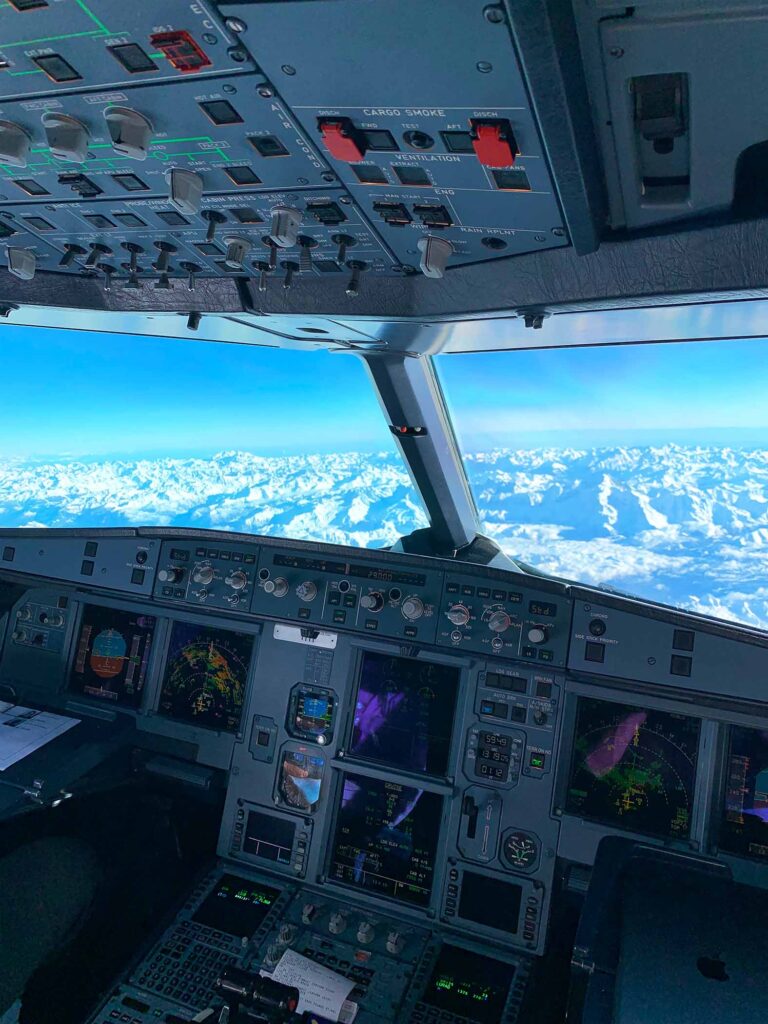
Just as we commence our descent, we get an ACARS message through that the wind has broken a power line at Gibraltar Airports ATC tower, and the airport is closed until further notice. We do our best to find any rough ETA’s for its re-opening but draw a blank. A new plan of action is discussed, and we still believe in giving our passengers the best chance of getting to destination, and elect to continue to head to Gibraltar and use 10 minutes of our holding fuel whilst there so we really are giving our passenger the best possible chance of getting in. If no ETA can be given after 10 mins, we’ll divert to Malaga with plenty of fuel in hand but it will unfortunately mean a 4 hour bus ride to Gibraltar Airport from Malaga for our passengers.
5 minutes later during the descent, we finally get an ETA for its re-opening and it’s not good news. We don’t have 3 hours of fuel onboard to hold until it re-opens so we immediately initiate a diversion to Malaga airport. Informing ATC of our plans and simultaneously messaging ops back home to get the ball rolling on bussing the UK bound passengers from Gibraltar to Malaga to ensure we don’t go out of hours as a crew. Being such an early start, any major delay runs the risk of putting the crew past the legal amount of hours we can fly per day, which leaves us unable to fly until the next day.
After we land and our disappointed passengers disembark, the 4 hours on the ground in Malaga for us consist mainly of eating, Netflix, reading, and more eating whilst sat on the aircraft waiting for our new passengers. You’re pretty limited on what you can do whilst stuck on stationary aircraft waiting for passengers.
By the time the passengers are all finally on, it’s looking like we’ll actually be slightly beyond our maximum flight duty period by the time we land in Gatwick Airport, so we all need to confirm we’re happy to go into ‘discretion’ in order to get these passengers back home that night. This is essentially extending our legal hours by upto 2 hours. It’s not a decision to be taken lightly; if you at pilots and crew decide to do it, and something goes wrong….the blame for incidents could immediately be placed on your decision to extend these hours. If any member of the crew isn’t willing to operate past these hours, the likelihood is that we’d all be placed in hotels for the night and fly back the next day. Flying back in yesterday’s underwear and a smelly shirt is never the nicest feeling. Thankfully on this occasion all the crew are in the same boat in wanting to get home and happy to extend the legal hours to do so.
It’s a standard landing for me back into Gatwick, it was dark when we left this morning and it’s dark again now. We part ways at the car park entrance, knowing it’s very unlikely we’ll fly with each other again that year, such is the nature of a large operation like easyJet at Gatwick airport.
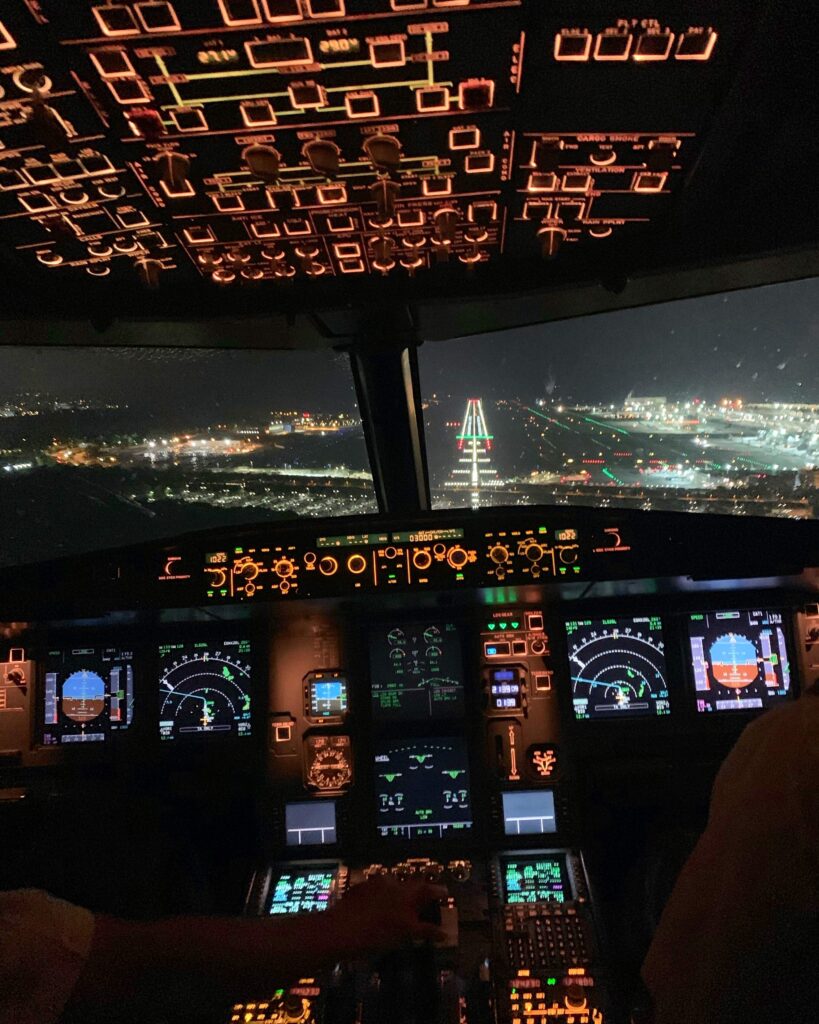
I get back home around 7pm. It’s been an exhausting but rewarding day with plenty of variety and challenges. Obviously, every day couldn’t be like this as it wouldn’t be sustainable as airline pilots, but it’s definitely enjoyable getting a day like today where we really use our brains.
I’ll be up early again tomorrow, a similar wake up time for a similar length flight so it’s lights out by 20:30.
I’ve always been fascinated and weirdly obsessed with anything that flies. More so helicopters than planes, but renumeration played a part in my chosen career path. Although the initial outlay is more to get into the front seat of a shiny Jet, it’s generally easier to earn bigger bucks sooner.
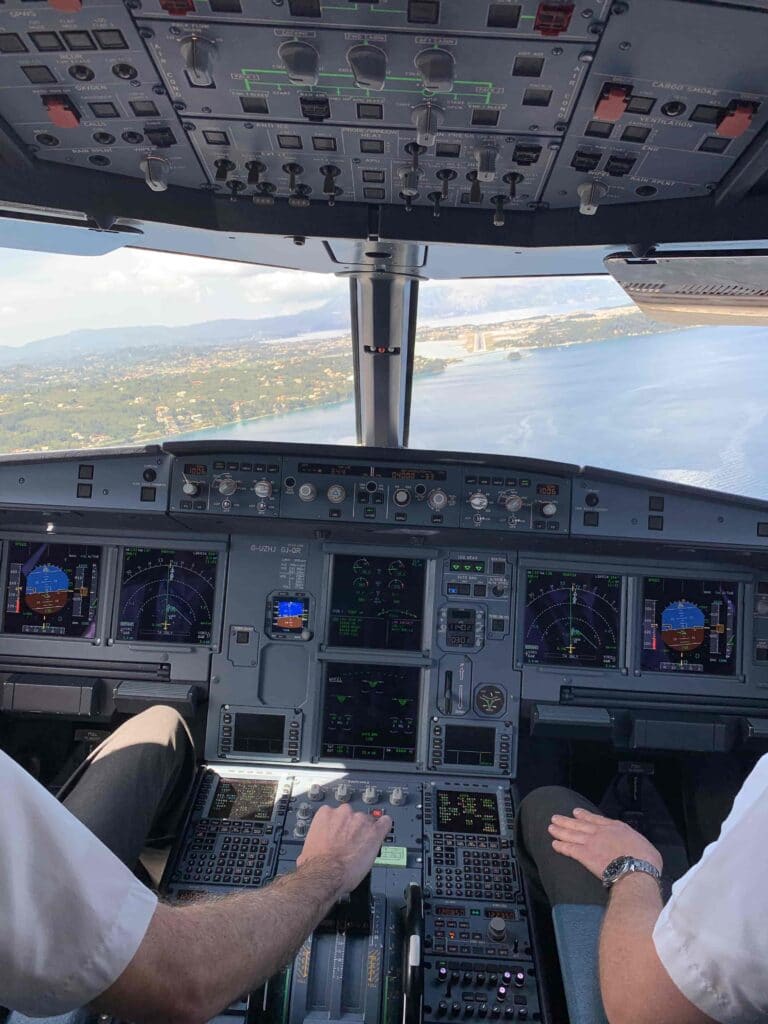
My favorite part of being an easyJet First Officer would have to be leaving a dark and gloomy English day behind us as we break through the cloud at sunrise. You get a real feel for the power and speed of the aircraft you’re in when you’re this close to the clouds, and the knowledge you’re about to get your breakfast brought into you whilst you sit and enjoy yet another spectacular sunrise is quite special. It’s moments like this where you’ve gotta kick yourself and be truly appreciative of the position you’re in.
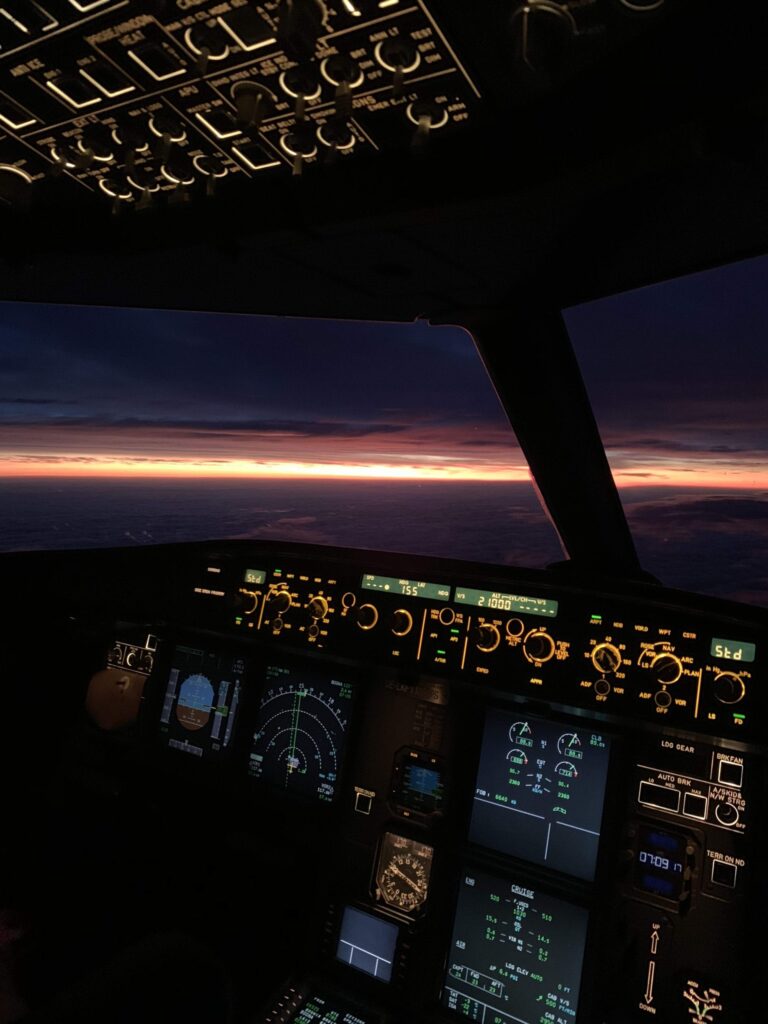
The companies “Just” culture, which implores employees to be open and honest about mistakes they may have made that lead to unfavorable situations, in order to help ensure other airline pilots don’t make the same ones. It’s very important in this day and age, especially in aviation and it’s great the company are really onboard with it. This links into the companies sickness & fatigue policy. It’s slightly different for Cabin Crew, but when it comes to Pilots, it’s incredible, especially compared to other UK based airlines. It’s exactly how it should be, that if you’re sick or fatigued, you can simply say so and won’t be expected to fly.
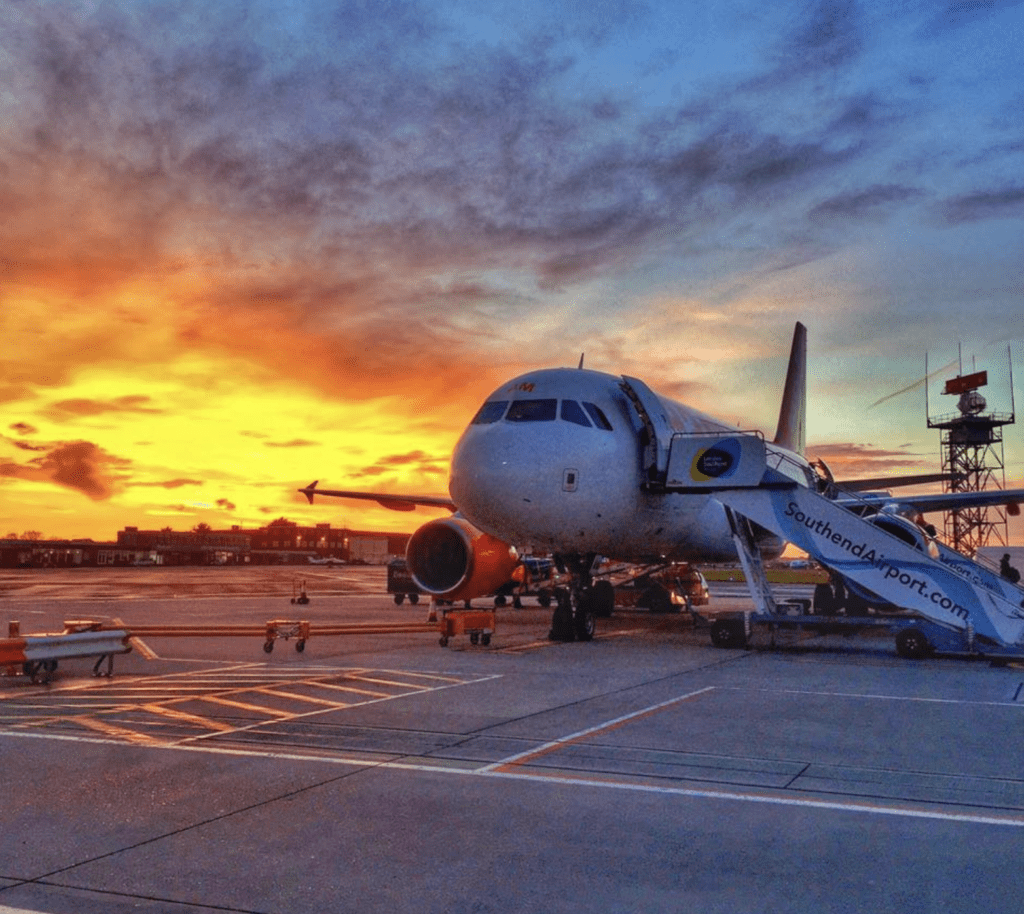
The working hours – There’s no two ways about it, the human body isn’t designed to be woken up at 3am to go to work. Add a 12-hour working day onto the back of that early wake up, 3, 4 or 5 times on the trot, and any normal human will find themselves physically and mentally drained. Our days aren’t all that long but unfortunately, most airlines now treat the EASA FTL’s (legal maximum hours an airline pilot can do in a day due to human performance) as a target to work towards rather than stay well away from. See an example of an easyJet pilot schedule in our post here on Commercial Pilot Schedules.
It’s a real challenge to get any sort of normal sleep pattern due to the changing between earlies, lates and days off. This can and does often have huge impacts on your life and close relationships. As a testament to this, just count how many adverts for divorce lawyers you see in any edition of the BALPA (Pilots Union) magazine!
The hours are nearly always very antisocial ones and there’s a real lack of flexibility. Weekends are out the window. It’s super hard to plan ahead of time as we only find our rosters out on the 17th of each month for the next month. Whilst you can be on a fixed pattern when you become a senior first officer with easyJet (5 on 3 off, 5 on 4 off) people tend to stay on a flexible pattern (won’t know working days until 17th) as you often end up with more days off and not always blocks of 5 on. It’s almost impossible to swap working days so your life must work around your roster.
Lack of mental stimulation – This plays a real factor on longer flights for someone like me who likes to be physically active & mentally stimulated. Being locked in the cockpit for up to 6 hours at a time means severe lack of physical stimulation. There’s no room to pump a few star jumps out in there to get the circulation flowing as the you’re unable to even stand up straight. If the other pilot is relatively quiet, it can make for a real lack of mental stimulation too.
Apart from a fuel & systems check every hour there’s not too much to focus on during the cruise. You can read the manuals but there’s a high chance this will induce tiredness!
Lack of social connection at work – I’ve been and easyJet first officer for nearly 7 years now, based at Gatwick for 5 of them and the only people I know within the airline are people from my small base of 2 years, and friends from training 7 years ago.
As first officers, we rarely get to meet any other first officers. I do fly with some great captains but often everyone lives far from the airport, and it’s hard to build any sort of relationship over one working day.
It’s a very strange concept turning up to work every day, working with 5 strangers and then going home knowing you’re unlikely to cross paths again. It can be a lonely job at times, enhanced by the fact you’re usually doing this job during very anti-social hours, so you’re missing out on being with your own social circle, to spend your time in a very unsociable environment.
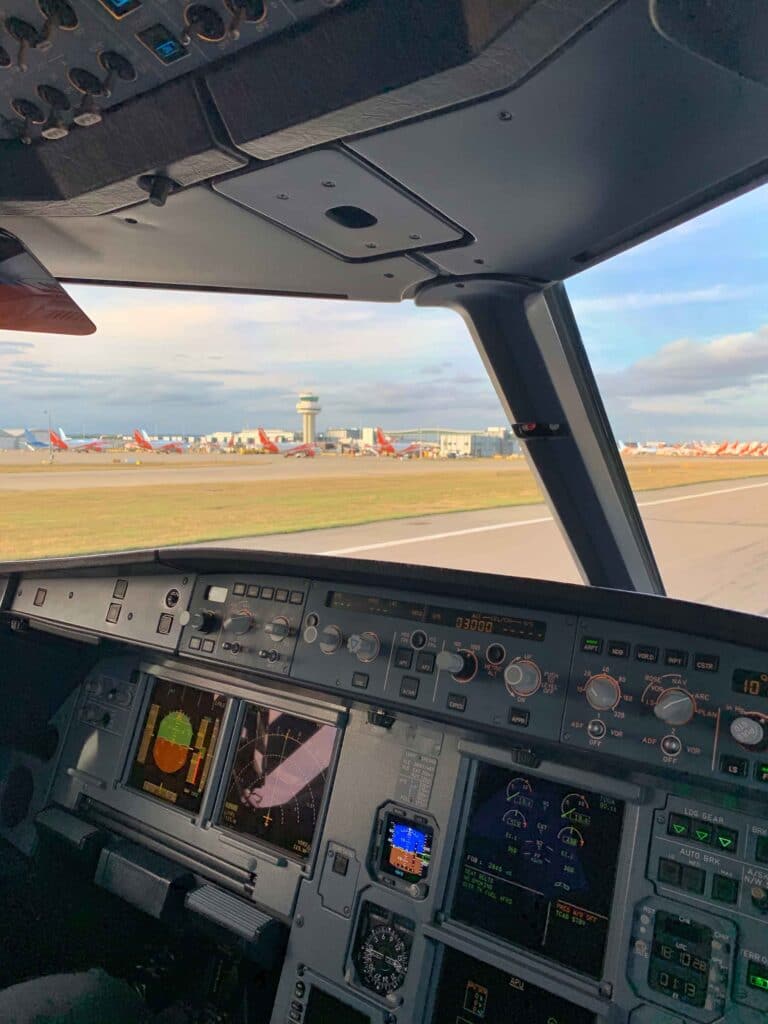
The impact it the rest of your life. This must be considered a lifestyle and not a job. It was something I was maybe naively, totally unprepared for going into the job and a factor I’d really recommend people get a full understanding of before deciding to enter this role. The hours, sleep cycles, relentless earlies or lates and unsociable working environment all have a knock-on effect. Yes, you get paid handsomely and the views & responsibility are incredible, but you give up plenty of control over your own life.
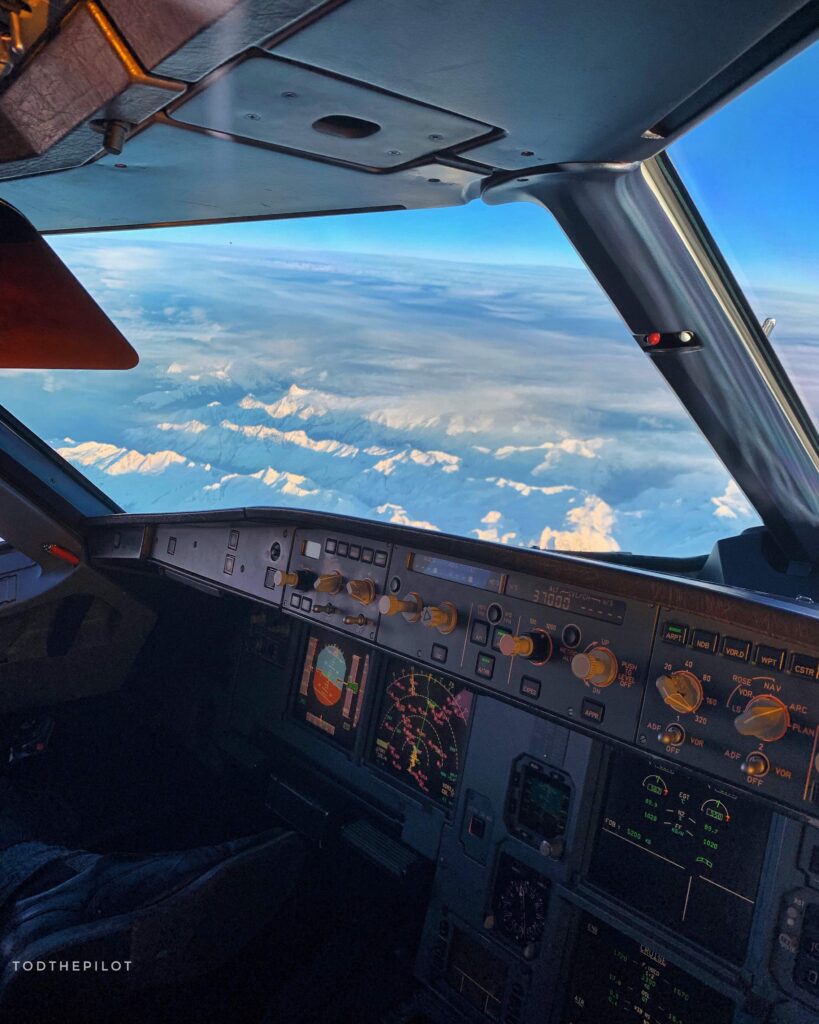
Landing into London Southend airport in stormy weather. During the decent the turbulence had been so bad that at times it was hard to read the instruments clearly or get hold of the correct knob to change heading.
Southend airport has a short and narrow runway, so the allowable crosswind limits are less than elsewhere, but the wind was gusting across right on the limit. I was pilot monitoring. At just a few feet off the ground, as the aircraft was about to touch down, a big gust hit the side of the aircraft, raising one wing and lowering the other. We lost speed, so the aircraft dropped like a rock, hit the runway, and bounced hard which got us airborne again, catching the huge gust of wind from the right again which made the aircraft drift rapidly left of the centerline as we were dropping again. If we’d initiated a go-around now, we would have hit the deck again anyway before the engines had time to spool up (it can take upto 7 seconds) so we let the aircraft drop and the captain wrestled it back onto the center line.
It was one of the moments that really stand out because it made me realize that although we had most bases covered, some things in this game are still out of our control as airline pilots, and can lead to stressful moments. The captain did a sterling job of landing it and I believe made all the right decisions. The wind was on limits so didn’t really warrant a diversion. There was nothing we could have done to avoid the wind variations close to the ground, and if we did a go around it would likely have led to us just going through the same process again.
I would have held out for the RAF to start recruiting again. I believe it’s an absolutely great path into flying and you can go and have an extremely interesting and challenging 8-10 years as a pilot, and then come out and decide what you want to do with your career and whether the airline pilot path is right for you.
It may also have been fun to try some other varieties of flying before hand, such as Private Jet flying like Tyler, or Sightseeing Flying like Karl, or African Bush Flying like Tariq. I also would love to have gone into flying helicopters, and do something like Charlie who wrote the article Heavy Lift Helicopter Pilot Life.
That aside, I genuinely don’t think I would have done anything differently. I’m happy with where I’m at as an easyJet First Officer and the decision to move onto a part time contract recently was one of the best decisions I’ve ever made.
Absolutely not. As an EasyJet First Officer I average around 1 night stop per year, usually in glamorous Glasgow and you’ll be flying back the morning after you land.
Occasionally. If you’re fatigued, then you shouldn’t be at work in the first place. But do a couple of 12 hour early starts back-to-back, and any human is going to feel tired. There’s 2 of us in the cockpit so we take advantage of this by using “controlled rest” to mitigate the tiredness. The whole crew onboard will be aware one of the pilots is having some rest. Cabin crew will call through to the cockpit every 15 minutes to ensure the other pilot is still ok.
Read Pilot Bible’s own post here for more about pilot tiredness
I went part time mainly to gain some control back over my life and give me time to explore other avenues, whilst learning and working on personal development in other areas of my life. I enjoy my role as an easyJet First Officer more now.
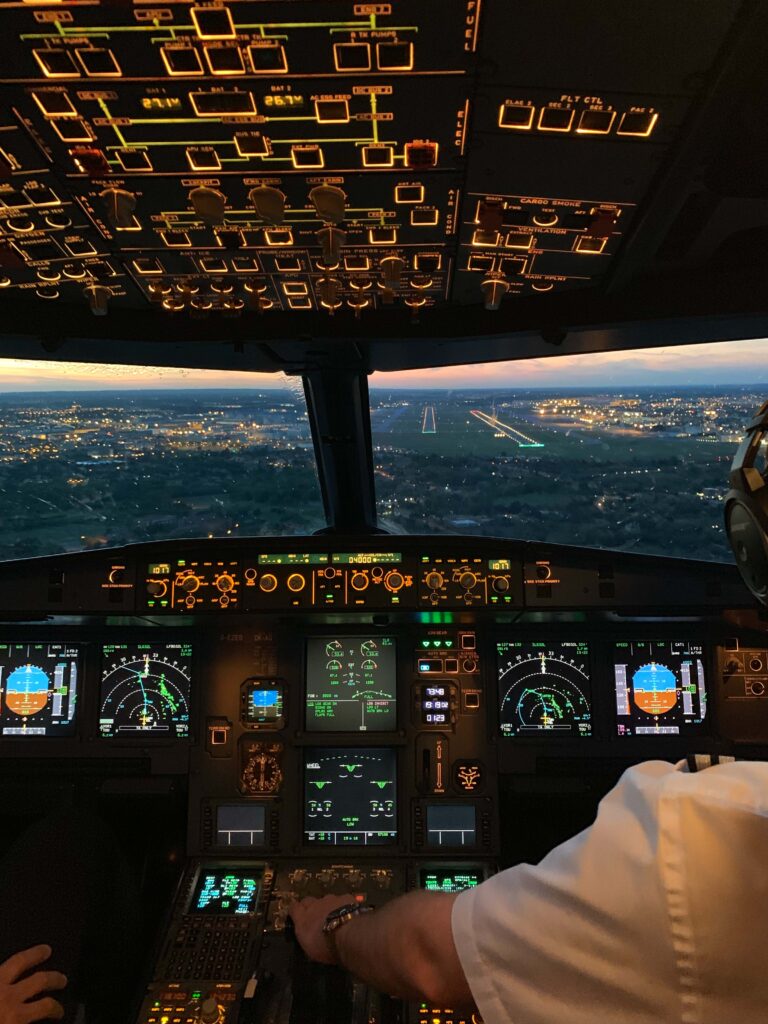
If you’ve read all the above and you’ve still got a burning desire to do, then absolutely! It’s a good job and you get well paid for what you do. My personal advice if you’re fresh out of school would be to seriously look at the military as an option. Go to some military base visits and see if you’d enjoy that life. It’s a way of getting your license without a £100K loan and you can still end up flying commercial jets just a few years down the line. If for whatever reason the military isn’t for you and you’re really set on flying airliners, easyJet is a good place to be.
In Summer a full-time easyJet First Officer can expect around 90 hours of flight time per month. In Winter this will drop off significantly and you’ll have more free time.
This is an example of an easyJet pilot roster on the 5/4/5/3 pattern (5 days on, 4 days off, 5 days on, 3 days off)

Starting in the right-hand seat, the salary for an easyJet second officer will be around £40,000 but with no sector pay. This will increase over the next 5 years up to around a total package of £75,000 for an easyJet Senior First Officer Salary.
When you gain command and switch seats (which used to take 5 years but due to COVID may now be much longer) you’ll be on the easyJet Captain salary, where you can expect a total package of around £146,000. This set salary won’t increase from there like some legacy airlines, but your loyalty pay will bump up 5% every 5 years you’re here, up to 15% of your total package.
Gain command with easyJet. I’m looking forward to the increased mental stimulation this will bring to the role and added sense of responsibility. The plan would be to stay full time to get some cash saved up and then return to a part time contract. There are many other interest and passions I want to explore in my life and that mix will allow me to do just that.
I’ll continue flying light aircraft for pleasure on the side of flying, with the occasional play in a helicopter.
Pilot Bible E-Book : How To Become an Airline Pilot in 2024
EasyJet Pilot Recruitment Page
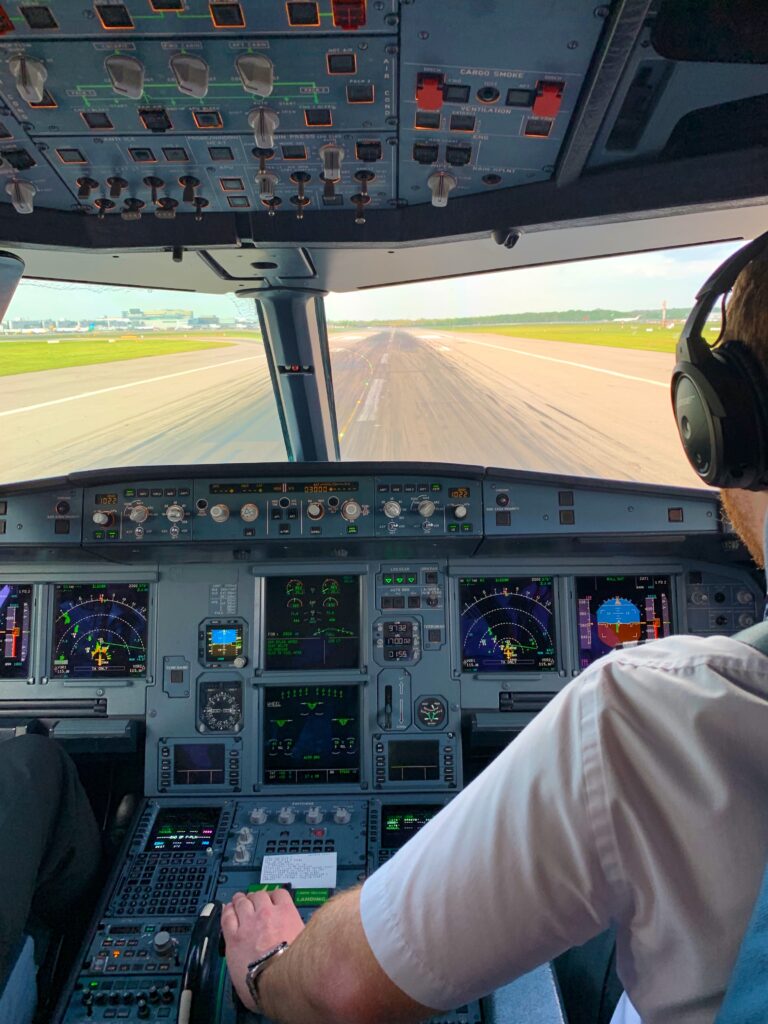
We’d like to thank this easyJet First Officer for sharing their awesome insights into their day job! If you have any thoughts or questions, please comment!


This series aims to bring you insights into the daily life of pilots around the world in varying industries to hopefully expand your knowledge and enable you to make more suitable career decisions. If you like it, please comment!

Discover what it’s like to be a London Air Ambulance HEMS helicopter pilot. Adele Dobler shares her career path, insider insights and advice for aspiring pilots.

What’s it like to run a helicopter business? One day you’re flying, the next you’re juggling maintenance, customers, and logistics—no two days are the same. In this article, helicopter business owner Frazer shares a behind-the-scenes look at the huge variety that comes with the role.
One Response
A very insightful post! Thanks!
I’m extremely impressed with your writing skills as well as with the layout on your blog. Is this a paid theme or did you customize it yourself? Either way keep up the excellent quality writing, it’s rare to see a nice blog like this one nowadays.